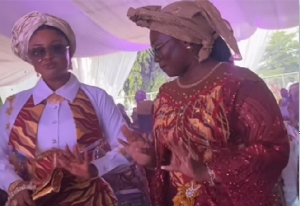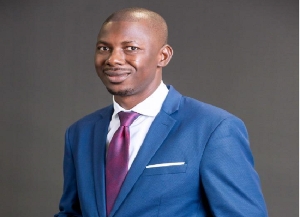- Home - News
- TWI News | TV
- Polls
- Year In Review
- News Archive
- Crime & Punishment
- Politics
- Regional
- Editorial
- Health
- Ghanaians Abroad
- Tabloid
- Africa
- Religion
- Election 2020
- Coronavirus
- News Videos | TV
- Photo Archives
- News Headlines
- Press Release
Opinions of Saturday, 21 February 2015
Columnist: Sarfo, Samuel Adjei
Answering the Nkrumaist Arguments. Part Three
By Dr. Samuel Adjei Sarfo
Attorney and Counselor at Law
For the most part, the Nkrumaists have agreed that Nkrumah’s Preventive Detention Act (PDA) was wrong-headed. None of the arguments they make in support of it holds water. Like Nkrumah, they create in their mind’s eye a motif of non-existent danger for the country for which Nkrumah needed to incarcerate his own cabinet members as well as members of the opposition in order to stabilize the country. They go ahead to criminalize all the members of the big six as traitors who were behind numerous attempts to assassinate Nkrumah. But the hint one gets in this whole saga to white-wash Nkrumah’s PDA is their awareness that the act was per se evil but necessary under the circumstances. We do not need then to debate anything further, except that no leader is deemed great who committed Nkrumah’s kind of necessary evil; and if we have to make references to necessary evil somewhere else to justify any evil perpetrated by Nkrumah, that ends the debate right there and justifies our designation of Nkrumah as a brutal dictator. This is so because no act of excusable evil could credential a knee-jerk leader as a hero. A hero’s credential is intrinsic in some act of ultimate good and self-sacrifice and dedication in the face of great tribulations. Since Nkrumah merely exploited his perceived tribulation and turned it into an excuse to embark upon a course of action to benefit himself, his acts are never those of a hero, but rather that of a brutal dictator who might have instigated tribulations in order to justify his actions. For because of the so-called agitations in the country, he abolished all opposition, declared Ghana one party state and declared himself president for life. These are all self-serving acts of a person whose psychological orientation was bent toward congenital tyranny. In the face of all these self-concocted problems, Nkrumah had his image emblazoned upon our national currency, his statue erected at parliament house and certain books, like Orwell’s “Animal Farm” banned. His tyrannical acts and massive corruption also inspired two satires of note within the African’s intellectual circles: Ayi Kwei Armah’s “The Beutyful Ones are Not Yet Born”, and Wole Soyinka’s “Kongi’s Harvest”.
And unless a person has his/her brain irreversibly twisted by Nkrumah’s Young Pioneer and Ideological nonsense, Nkrumah should be the greatest example of what no great leader will ever do. For a great leader begins life essentially as a great and noble person full of character: wisdom, compassion and foresight…… But Nkrumah was essentially irresponsible if not altogether wicked: there is no record that when he traveled abroad, he helped his mother or family members or any of the people in his community at Nkroful. The impression one gets is that he abandoned them. There is no record that he performed any reciprocal kindness to any of the numerous friends that helped him to rise in life. Rather, there is a record that he incarcerated most of them. He did not possess the wisdom or the foresight to see clearly that after all his sordid acts of betrayal of friends and comrades, he was exposed and alone and without any protection, whether physical or spiritual. In the end, bereft of all the nobility and trappings of leadership, he was violently overthrown to die miserably in exile, where he never again saw his own wife and children again. There is enough punishment here alone to qualify his fate as poetic justice. In Grecian mythology, leaders who exhibited Nkrumah’s kind of hubris were similarly punished by the gods…..
So elsewhere, wise folks will cite Nkrumah as a lesson in evil leadership and its eventual consequences, and never as a model to be emulated in any way. We should see him as a kind of Agamemnon who was so drunk with power that he must sacrifice his own daughter to turn the tide. Yet the man has an army of crack-headed, septuagenarian and demented sycophants who, in their youth, became demeaned in Nkrumaism, a brain withering albeit farcical mythology in whose context the mantra has always been “Nkrumah does no wrong” and “Nkrumah never dies”. This mythology requires of these patients of Alzheimer’s disease to behave as lobotomies as they deeply inhale the dictator’s fart as they would some cologne of oriental quality, or lap up his freshly expectorated phlegm as they would some vanilla ice cream!!
But discerning individuals will know all about the charade and refuse to fall for it. They will understand that detention without trial is wrong, that one party state is wrong, that abolishing all opposition is wrong, that weakening the judiciary is wrong, and that creating a personality cult is wrong. And when they understand all these, they will also wonder what exact leadership attribute to confer on a man who showed no loyalty in friendship nor compassion in power nor wisdom in his rule. Then they will go ahead and question what philosophy truly undergirded his leadership posture or desire for African unity. Thereafter, genuine questions will be posed as to exactly what constitutes his leadership or intellectual legacy to which present leaders can reference for their guidance. At this point, the whole charade of Nkrumah’s leadership model will come tumbling down like the wall of Jericho!
Then, in whimpers of desperation, his undeterred and unlettered followers will point to his widespread infrastructural development of the country as a testament of his achievements. But that is also easily debunked by modern economic stewardship models. Let us begin by considering all the amount of money the colonial government left to Nkrumah’s administration and let’s say it was some 120 million pounds.
120 pounds translates to 200 dollars which in turn translates into the following dollar amounts using the seven known standards of measuring wealth:
$1,660.00 using the Consumer Price Index
$1,280.00 using the GDP deflator
$2,010.00 using the value of consumer bundle
$2,040.00 using the unskilled wage
$2,490.00 using the Production Worker Compensation
$3,820.00 using the nominal GDP per capita
$7,060.00 using the relative share of GDP
From the foregoing, the preferred standard is Relative Share of GDP. When this is used, we can estimate that the amount left with Nkrumah was $7,060 multiplied by a million, or a little over seven billion dollars.
Then for the whole of the years that Nkrumah was a leader, let us hypothesize that the gross domestic product of Ghana stood at a meagre 70 million pounds per annum. From say 1957 to 1965, we will compute this amount to be another 560 million pounds which translates into something akin to 32.6 billion dollars. Add this to the original 7 billion dollars and arrive at over a whopping 39 billion dollars. This fund was, by conservative estimation, what was at Nkrumah’s disposal to be disbursed on a population of a scanty five million people over a period of nine years. From this astronomical amount, subtract whatever Nkrumah is said to have disbursed in his time on the Tema Township, railway lines, airports, schools, bridges, factories, ministries and government recurrent expenditure, etc. (Note: The Akosombo Dam was constructed by Kaiser under very insulting contract terms that could only be acceptable to that dimwit at the helms of government. Kaiser funded the project, and Nkrumah’s give-away of Ghana’s resources was only re-negotiated by (surprise!) the Rawlings regime in the early 1980s) and you will see that there are more questions than answers regarding Nkrumanomics, which should be a metaphor for the craziest and most inept economic policy wherein a political leader spends like a drunken pirate.
In any case, much of Ghana’s resources were devoted to that tyrant’s pipedream where countries like Mali and Guinea benefited from Ghana’s largesse each to the tune of 10 million pounds (about £203,844,752 today). A considerable chunk of the country’s resources was also devoted to the cause of imposing Nkrumah’s type of tyrannical leadership on the whole of Africa and christening this as liberation of the whole continent of Africa. The rest was stolen by his cronies and praise singers who, probably without his knowledge, stashed their moneys in foreign banks as rats futilely stash nuts on a sinking ship.
The foregoing will portray a man who had no idea of simple economics and simply did too little for so much and wasted the national treasures on his personal adventures. Nkrumah’s notion of government as the gubernatorial property of the leader still informs today’s political leaders who think that the opportunity to serve the country is also an opportunity to loot the country.
In the end, Nkrumah left no legacy for Ghana whether political or economic: his leadership style is abhorrent within the present democratic dispensation. And although he did indeed leave massive infrastructural edifices for the country, an assessment of these impressive infrastructures ought to be pegged against all the resources available to him vis a vis the scanty population and modest needs of the country. If we do the math well, every discerning person will see the sham and charade being perpetrated on the minds of the gullible Ghanaian that Nkrumah was a good economics steward. Nkrumah was no leader, let alone a great leader; and those pointing to outsiders’ glorification of him as evidence of his greatness should sit down and reason well, because none of those outside panegyria debunks the irrefutable facts presented here to support the thesis that as far as political leadership and economic management are concerned, Nkrumah was patently clueless.
Samuel Adjei Sarfo, JD, MA, BA, etc. is an Attorney and Counselor at Law, a Teacher of Lore, Certified High School English Educator, Researcher and Scholar. He can be reached at sarfoadjei@yahoo.com










